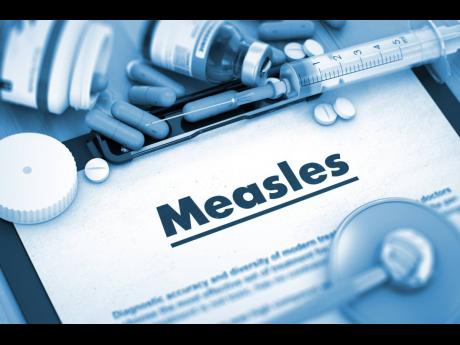Take charge of your travel health: Protect yourself against measles
I had mumps as a child. Had I not been vaccinated, I might have had a more severe disease.
Time Magazine reported on April 18, 2019 that a 43-year-old female flight attendant had fallen into a coma after contracting measles. The age and sex remind me of the make-up of our Jamaican workforce. She had received one dose of the measles, mumps, rubella vaccine, or MMR, as a child.
WHO GETS MEASLES?
The World Health Organization reports that over 110,000 people died from measles in 2017. Now, at nearly 600 cases in 2019, the United States is set to hit a new record number of cases since it declared measles eliminated from the US in 2000. The measles virus can be spread by coughing or sneezing, or touching places touched by someone with measles. It can live in the air for up to two hours after someone with measles leaves a room. Symptoms can take one to two weeks to appear after initial exposure. Symptoms and signs include fever, runny nose, watery red eyes, cough, white spots inside the mouth, and a rash. Measles can also cause inflammation and swelling of the brain, deep infection of the lungs, watery stools, and ear infection.
ARE YOU PROTECTED?
Persons may be uncertain whether they are protected from measles; others may believe that they are protected when in fact they are not. Fortunately, there is a way to find out. Like everything in good medicine, we start by asking about your general health, and whether you have ever had measles before. We also like to see your immunisation card, if you can find it. We can take a small blood sample and check the level of anti-measles antibodies you have. Antibodies protect you from germs. If you plan on travelling, it is good to see your travel health doctor about three weeks before departure. It may take a few days to get back your lab results. And if you get the vaccine, it usually takes up to two weeks for your body to produce protective antibodies.
WHAT IF I ONLY GOT ONE MEASLES VACCINE DOSE GROWING UP?
Given in two doses, the first dose is given at the age of one year, and the second about 18 months old. The US Centers for Disease Control and Prevention (CDC) indicates that getting one dose of MMR is 93 per cent effective in protecting against measles, and with two doses of MMR, it is 97 per cent effective against measles (and 88 per cent against mumps).
Was I in the unlucky 12 per cent who got mumps? Well, vaccines do make the disease milder, even if you do get the disease, and make it less likely for you to spread it.
One person with measles can infect about 16 other persons! To put this in perspective, one person with the flu can usually pass it on to two other persons. To prevent a measles outbreak, 95 per cent or more of the population should be vaccinated. At Jamaica’s last check, we were at about 89 per cent for dose one, and 82 per cent for the second dose of the MMR vaccine.
WHAT ARE THE SIDE EFFECTS OF THE VACCINE?
If you have had a serious allergic reaction to a prior dose of the vaccine, it would be safe to say you shouldn’t receive another dose. Someone can be seriously allergic to anything, for example, some people break out in an itch in response to peanuts; this can happen with any medication. Some persons may experience a mild fever, pain or redness where you get the injection, or mild joint pain in some women.
WHAT YOU CAN DO NOW
If you are in doubt about whether you are protected from measles, see your doctor for a check-up. If you develop a fever with a rash, it is important to seek medical attention.
Dr Yohann White is medical director at Para Caribe Consulting Medical Doctors, Phoenix Avenue, Kingston, Jamaica. @CaribeWellness. Email yohann.white@caribewellness.com and yourhealth@gleanerjm.com.



